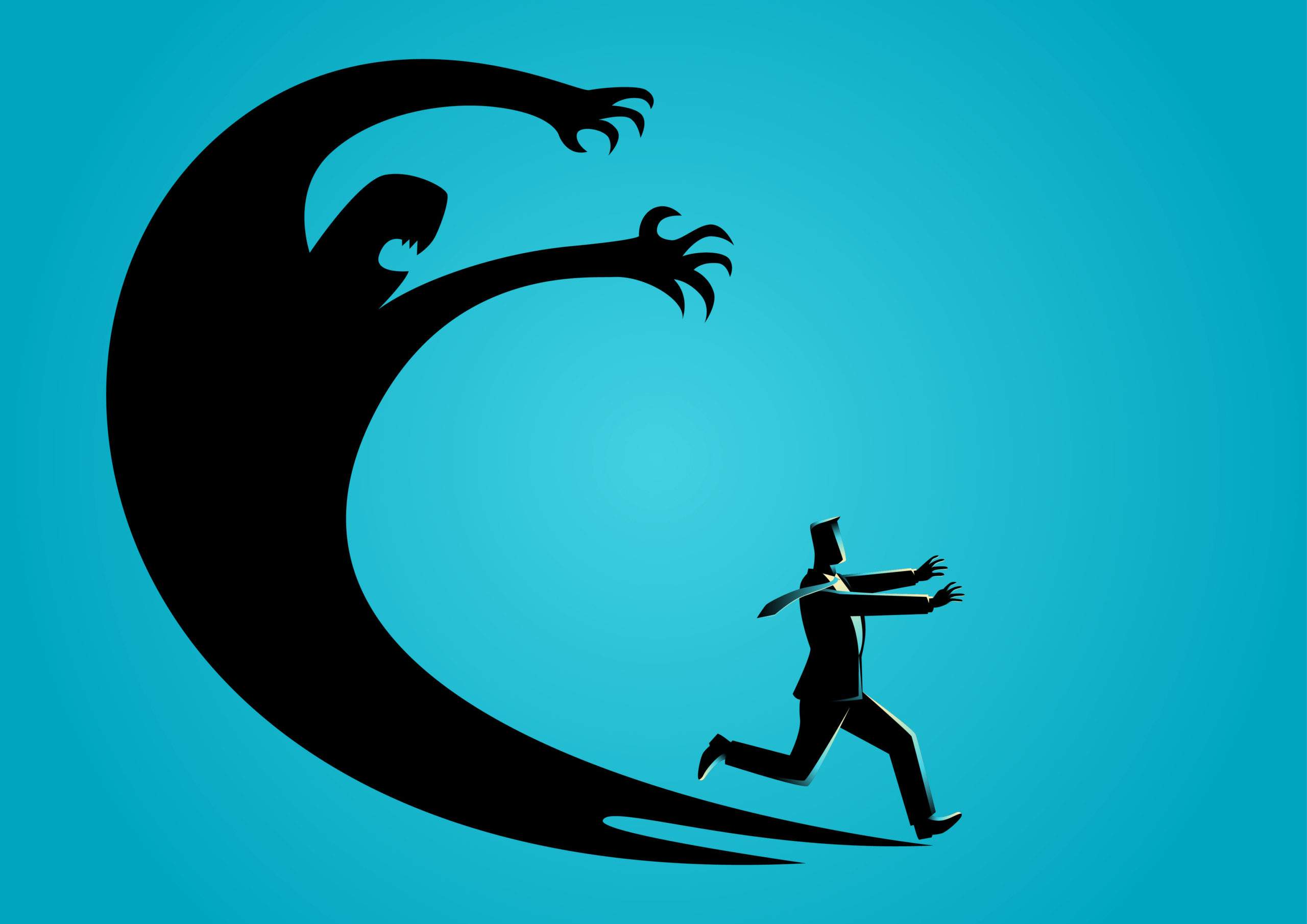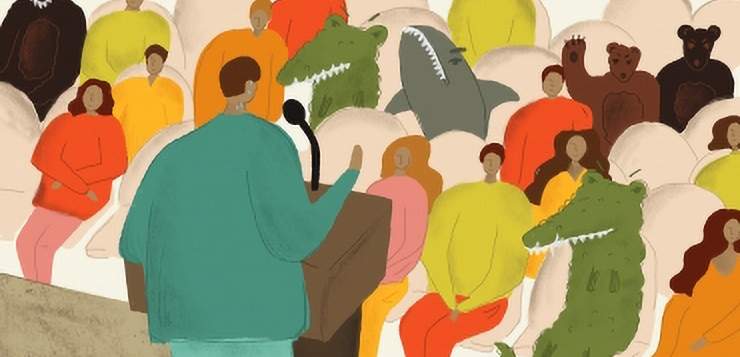I’m standing on stage in front of 150 people, the spotlight bright in my eyes, the microphone solid in my hand. Their faces stare up at me, expectantly. I’m there to tell them a story. For a lot of people, being on stage in this way is a nightmare. Stage fright can make your heart pound, your mouth go dry, your limbs quake. But not me. I’m comfortable here. My worst nightmare awaits me later, at home. It’s also what I’m on stage to talk about.
“For decades—my whole life, practically—I’ve lived with a persistent, debilitating fear of being murdered in my bed,” I tell the audience. They laugh uproariously. They’re not being insensitive—I’m telling it funny. That’s how I always tell it. I run through the list of ghosts that haunt my overactive imagination: Sasquatch, vampires, Adolf Hitler, the Loch Ness Monster, Jesus—that crown of thorns, all that blood—those phantoms of my childhood. Then the Boston Strangler, Ted Bundy, the Zodiac Killer—the true-crime menaces of my late-night adolescent reading. Fear has been my constant companion for as long as I can remember.
It’s not totally surprising. I was a girl in the 1970s and ’80s in southern Ontario. I read the newspaper every day from the age of nine or ten, and my mother’s magazines—Family Circle, Women’s Day—and they were all always cover-to-cover, it seemed, with violence against girls and women. Kids my age disappearing from the hallways of their apartment buildings, or last seen on the subway heading downtown to a movie with friends. Women like my mother followed through parking lots, pulled into vans, when out for a walk, flagged down
to help someone in need, and then never heard from again. I learned to walk with my keys threaded through my fingers. I read conflicting advice on whether to fight or submit. When my hair was long, I learned to keep it tucked into my coat so it couldn’t be used to apprehend me from behind.
Fear has been my constant companion for as long as I can remember.
Some of that fear was caution, and self-preservation, I guess. It was the water I was swimming in—misogyny and men’s violence against women was baked into the society in which I grew up, from the news headlines, to the murder mysteries my mother read, to the movies and television shows we all watched. But that fear also flicked a switch in me that was hard to switch off. I became hyper-alert.
’Fraidy Cat
Looking back now, I can see I was living with anxiety from the time I was small. We didn’t call it that, then. We called it oh don’t be such a baby, and she’s afraid of her own shadow, and don’t be ridiculous. And to be fair, a lot of what I was afraid of was utterly ridiculous. Parked cars (they could become moving cars at any moment!), our furnace room (likely last known location of Sasquatch), a picture of a marble bust in a book (I can feel that statue watching me). As a lifelong writer, my imagination was my best friend. It was also, it seemed, bent on terrorizing me. And I was helpless before its infinite power.
I knew how to make it funny, though. And I did that, in the daylight hours. The story of my fear became one of my funniest set pieces, one I returned to again and again, especially once I learned, later than is comfortable to admit, that not everyone is paralyzed by fear at night. When I realized that this fear was unusual, I went to town, pulling out every formative experience that solidified my terror. I’d gotten up to pee one night when I was seven or eight, and, half-asleep, collided with my father who was making the rounds of us kids, ensuring we were safe and sound before he and my mother turned in. Scared the daylights out of me. The night I’d stayed up, home alone at the age of 17, reading about the Zodiac Killer, too scared to go to sleep till I got through the story, and utterly uncomforted by the inconclusive ending—the Zodiac Killer was still out there! What if he was in Mississauga, Ontario, in my boring, quiet neighborhood? What if he was outside my very house right now! Is that the sound of the front door easing open? Footsteps on the staircase? (Never mind the contortions of logic, the self-centering acrobatics involved in the dark fantasy that this infamous murderer would target little old me.) I lay in my bed and shook. A figure at my bedroom door, barely visible in the first streaks of dawn. I opened an eye. My father, again. He and my mom and my younger siblings had been on a road trip and decided to drive all night for home.
Here, I feel I should say a word about my father: He was gentle and smart, stubborn and fair, capable and wise. I loved him and he loved me. I was never afraid of him. But he did have a way of being in the wrong place at the right time.
On stage, the crowd loved these stories, laughing and gasping at all the right moments. But lately, I’d had the sense that maybe this fear of mine wasn’t hilarious. I’d been telling two friends about it, in my jokey way, and they looked concerned. “It’s OK!” I said. “It’s hilarious!” But their reaction stayed with me. Maybe it wasn’t hilarious—or at least, maybe that’s not all it was.
After the show, women found me outside the venue to tell me how much my story resonated. They, too, were afraid of being murdered in their beds, and they were so glad to know they weren’t alone. It was worth it, I thought, and I floated home on the wave of praise and belonging. I had my best night of sleep in a long time, no fear, even though my spouse was out of town and I was alone in our three-bedroom house.
The next night, though. Wow.
Fear Itself
It started early, before darkness had even truly fallen. I worked from home, alone, with no fear during the day. I taught creative writing to my students as the sun set. The parents of one of my students had been in the audience the night before, and the dad made a weird comment at pickup time. The switch in my mind flicked to High Alert. When the students and parents cleared out of my living room I noticed the little twinkle lights I keep along the mantel in winter were switched on—and I hadn’t done it.
If this were a television drama, the violins would be layering in tension. The Fear had me and it wasn’t going to let up.
In bed that night I reminded myself I’d checked the doors and they were locked. My mind imagined a patient murderer, lying in wait for me. I lay in bed, solid with fear. I held my breath. Every sound magnified. The absence of sound untrustworthy—surely the calm before the violins returned.
I’d doze, then wake, heart pounding, was that a sound? What was that sound? The front door easing open? The back? Someone coming in the kitchen window? Is there someone in this room? My eyes strained to tease out the strands of darkness that surrounded me.
This was a familiar routine. It was my nightly opera. I tried to talk myself out of my fear: Don’t be ridiculous.
What would that even look like, a life without this persistent, pervasive fear?
This is the most egotistical fantasy ever. You think you’re such a good catch for a murderer that he’d wait till you’re tired of watching Netflix, done puttering around the kitchen, finished reading your book? It’s absurd. Illogical. Most people do not get murdered in their beds. Go to sleep.
Surprisingly, my stern litany of self-talk did not result in restful sleep. Most nights, I would eventually fall into uneasy slumber. But this night was different. This night, the terror wouldn’t let me go. And I did what I had never done before.
I clicked the light on. Heart pounding with fear and shame, I pushed a heavy piece of furniture across our bedroom door and I got back in bed.
I read my phone. I read a book. I felt terrible, like I had failed. And I was still sleepless, and terrified.
Later, I told a friend, who happens to be a therapist, about the experience— about telling the story on stage, and the frightening night that ensued. She nodded. “If you ever want to put that down,” she told me, “I know someone who would be a great match for you.” Put it down, I thought. Is that an option? I could just—put it down? What would that even look like, a life without this persistent, pervasive fear? I had only ever thought of The Fear as something to suffer. The idea that I could talk to a therapist about it and be free of it felt as outlandish
as the idea that an evil version of the Count from Sesame Street was behind the door of the bathroom of my childhood home.
Finding Comfort
I tried not to treat Debbie’s office like the stage at the Seahorse Tavern, but my tales of night terror have been so often told I can’t help falling into funny-storytelling mode. “I’m pretty sure it’s sound coming from my own face, every time,” I told her. “Snoring, grinding my teeth. I wake myself up and wait for the sound to reoccur, but because the sound originated with me, it never does, and then I’m just anxious and alert.”
“I also wear corrective lenses,” I told her, and so I can’t see much at night.
“So, you’re vulnerable,” she said. I agreed.
“I don’t know how to solve for that,” I told her.
“It’s not something you solve,” she said.
Oh.
Then she said: “Tell me about the murder.” And I said: “Oh, the murder doesn’t matter.”
My therapist is a cool customer. She nodded. “Then what are you afraid of?”
I thought about all the possible answers to that question. “Terror. I’m afraid of being terrorized.”
She nodded again, and she looked at me, her face soft and expectant.
“Oh,” I said. The edge of an idea began to reveal itself. “It’s me.”
I had been so afraid of terror for so long, that when the realization finally dawned it felt like a new day breaking. “I am terrorizing myself,” I said. “I am doing it to myself.”
Debbie’s prescription was that I find a comfort object, something I could reach for in the night when The Fear started to prickle up my back. Again, I was struck by the novel idea that com- fort was an option. “What have you been reaching for?” Debbie asked.
“Mostly logic,” I told her, “and stern self-talk.”
“And how’s that been going?” “Here I am,” I said.
Vulnerability and Me
That afternoon, my spouse left for a two-week tour. I was once again home alone, with all my vulnerability, which I was trying to think of as a feature, rather than a bug. (Most people don’t get murdered in their beds, I’d told Debbie. But some do, she had replied, in a way that was oddly comforting and affirming, allowing me to acknowledge my fear and the role it had played in trying to keep me safe, instead of trying to shame me out of feeling it.) When I returned home from running errands, I instinctually said aloud, as I came in the front door, “Ah, my cozy home.” This allowed me to feel comfortable, rather than to immediately begin worrying that there might be a murderer lurking in the basement. And later, when I went up to bed, I pulled back the blankets and murmured, “Ah, my cozy bed.”
But sometime after sleep came, I was awake again, startled by a close sound. Probably my teeth clicking against each other, I thought, though I already felt the creeping fingers of fear prickling up my back. I knew what would come next—the lid would fly off my imagination and I’d be in for it. I took a deep breath. I paused. You have a choice, here, I told myself. You can choose terror, or you can choose something else. I breathed again, curled over onto my side, and patted my own heart with my hand. Out loud, I said, “You deserve to
have a peaceful sleep, and pleasant dreams.” And then I closed my eyes and had both.
When I tell this story now, I still tell it funny—it’s my preferred mode. But I tell it, too, with a sense of wonder at the power of self-compassion, and how it has replaced fear as my nighttime companion.
The addition of self-compassion to my nighttime routine has occasioned a spillover into the daytime part of my life, too. Though stern and logical self-talk is still my first go-to, being kind to myself in the grip of night terror has allowed me to take another look at how I address myself during the day. And while the day-side shift is slower, when I remember to give myself the choice, I choose self-kindness every time—and that makes for better days, along with easier nights.
READ MORE
Befriending Fear: Working with Worry and Anxiety
The fear-response is a powerful emotional and physiological reaction that can be triggered by more than just an imminent physical threat. In this excerpt from his book The Mindfulness Solution, Ronald D. Siegel, PsyD, explores the human response to fear, and shows us how mindfulness can help manage it.
Read More
What Are You Afraid Of?
Public speaking is one of the most common fears people experience. Explore this mindfulness practice for conquering those butterflies in your stomach—without picturing the audience in their underwear. [Podcast]
Read More
Using Fear to Tap into Your Superpowers
Big wave surfer Chris Bertish shares the secret to performing at your peak.
Read More








